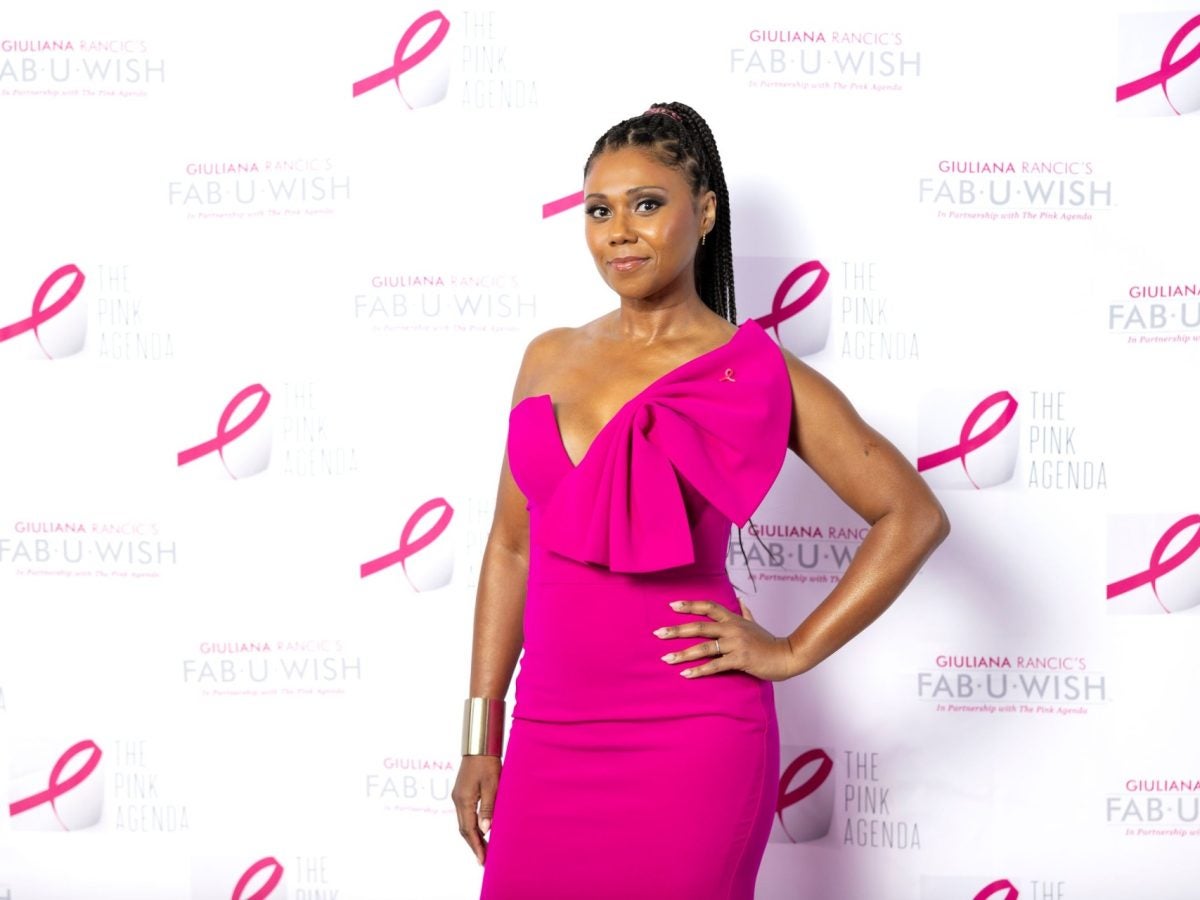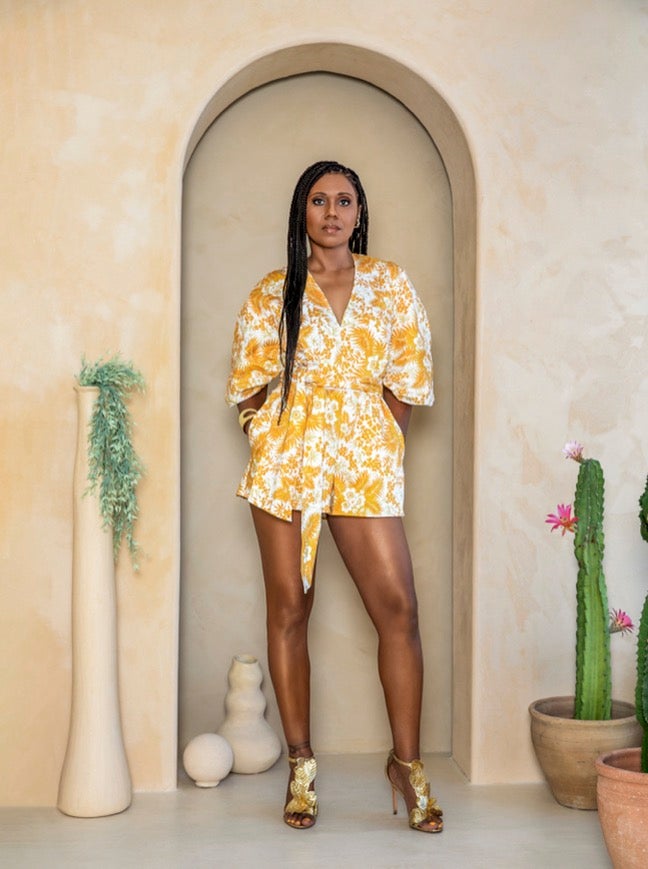
When Toks Olagundoye reflects on the day she was diagnosed with breast cancer, she remembers it vividly. The Nigerian actress experienced a flurry of emotions, but not the feelings that one would necessarily expect.
“Initially, I was annoyed,” she tells ESSENCE while chuckling, explaining that she’s had mammograms before, so she thought she knew what to expect from her physician. “He calls and tells me everything is fine, and I move on,” says Toks. This time, however, that was not the case. Olagundoye was diagnosed with triple-negative breast cancer, which, according to the American Cancer Society, is a more “aggressive type of invasive breast cancer” that can spread fast, comes with fewer choices for treatment, and can have worse outcomes. Black women, women under 40, and women with the BRCA1 mutation are more likely to be diagnosed with triple-negative breast cancer than women in other demographics.
Finding Peace in the Storm
Still, the wife and mother admits that her diagnosis also came with an unexpected sense of relief. Olagundoye’s family history with cancer is extensive, and she always anticipated a diagnosis. “There’s so much cancer in my family, particularly on my mom’s side,” she conveys. “My whole life, I was like, I’m probably getting something. I was like, well, I don’t have to worry about getting something anymore. Now I’ve got it, and I can just fix it and move on.”
The diagnosis came while she was a part of the cast of the Paramount+ series Fatal Attraction. She underwent five surgeries related to her diagnosis, including a double mastectomy and chemotherapy. Despite her rigorous treatment plan, the actress continued to work and take on new projects.

“Thankfully, I didn’t have to work every day, and they were really good about working around my schedule because I had three surgeries while I was on the show,” she recalls. “I’m lucky because I love what I do.”
Once filming for Fatal Attraction concluded, the theatre-trained actress shifted her focus, only accepting voiceover projects as she continued treatment. Her manager and agent were never hesitant to move things around and requested that assignments and deadlines be extended when she was too tired from chemotherapy to work. She also credits the support of her loving husband and parents for getting her through the difficult season. “I was really well supported. My mom and husband would chauffeur me around Los Angeles,” she shares. “I sat in gratitude for most of it.”
Opportunities Amidst Adversity
An additional blessing she was grateful for during her battle came in the form of a new opportunity. She nabbed the role of Olivia Finch, Harvard University’s psychology department chair, on the Paramount+ reboot of the classic sitcom Frasier.
“When I got Frasier, it was two weeks after my last chemotherapy treatment. I was exhausted, but I was so grateful,” she says. “There are so many people on the show whom I’ve always wanted to work with. I was honored and proud to be representing the Black community on a show that has been so white.”
Before her diagnosis, Olagundoye would overthink to the point of anxiety. But her experience wouldn’t allow it this time around. From her first day on the set of the series, she felt something was just different.
“I was so excited to be there. I was like, just show up and remember your lines. That’s all you gotta do. I just listened to what the directors and producers told me and did my best to show and be present. Everything prepared itself because that was really all I could do,” she shares. “It was a really emancipating experience. I usually worry about whether I’m doing a good job. Do I look ok? What is that person thinking? Am I going to get fired? I had just been hired looking the absolute worst that I have ever looked in my life, so I was like, I’ve got no worries. I got a great job, and I’m just going to sit in it.”

Adding to that gift is the phenomenal team on the Frasier set. She lauds the cast and crew, and its leader, Kelsey Grammer.
“He has done a lot for Black people in television,” she says. “This is a man who insisted that I wear my natural hair, and when I wanted to wear my braids, he said, ‘I think that’s beautiful.’ That’s what white men need to be doing. Use your power to help everybody else. Representation is so important to him that our writer’s room is amazing.”
The actress found that her newfound sense of calm and peace instead of anxiety and intimidation would carry over into other areas of her life as well.
“I realize that things are going to happen the way they’re going to happen whether you worry or not. There’s no reason to raise your cortisol and make everyone else crazy. I don’t want to make anyone else anxious. I don’t want to make anyone else’s day worse.” she says. “I’m happy my son won’t learn that level of anxiety from me.”
The Power of Self-Care
In addition to learning to forgo such concerns, breast cancer has made Olagundoye into a staunch proponent for Black women taking care of themselves.
“We deserve it. We have been taught that we don’t deserve the life we have. We’ve been taught that we have to take the crumbs we are given. We deserve the very best,” she says. “If you look at Black women and what we do and give to the world, we are precious.”
She emphasizes that self-care includes leading a healthy lifestyle, assembling a trusted healthcare team, keeping up with annual exams, and knowing the basics of breast health.
“If we don’t take care of ourselves, who will take care of our families?” Olagundoye asks. “Go to your annual appointments. Learn to do breast exams. Learn your breasts and learn what they feel like so that you know when there’s a lump that shouldn’t be there. If you feel like there is something wrong with you, if you feel like something is not right in your body, go talk to your doctor. If they don’t listen to you, go talk to another. I don’t care if it takes you seven months to find someone, you keep going until you do. Until you get the imaging done or do whatever testing you need. If you can afford it, get a genetic test. We deserve the best.”